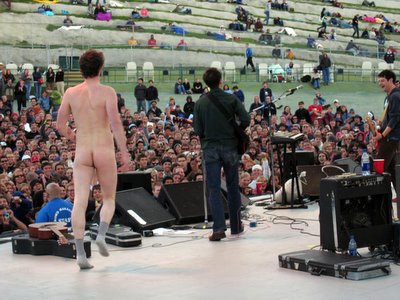I Think I Saw That Flying Squirrel Suit on eBay

{... this is another version of the version of the version I misplaced somewhere on my hard drive, so until that gets re-transcribed, enjoy this one. I was still wobbly from surgery and more than a tad zonked on Vicodin when I made it through a cold February rain to her loft. What with the French roast, the green tea cookies, and the smart conversation, I really hated to leave. Stay tuned for an update ...}
One day the phone rings. Laurie Anderson picks it up. It’s NASA, a voice says, and we want to hire you as our first artist-in-residence.
Now, Anderson, a performance artist who has hitchhiked to the North Pole and experienced near-death in the Himalayas, is as intrepid as she is insatiably curious. But this threw even her for a loop.
She hung up, thinking it was a prank. And a pretty damn good one. NASA called back, and Anderson spent 2002 doing all kinds of things she never imagined. “They never had one before,” she says. “So I said, "What do I do?" And they said, "We don't know. What do you think you should do?"
What Anderson did was create The End of the Moon, her current one-woman show that comes Nov. 20 to the Art Institute of Chicago. “It was incredibly freeing,” Anderson says. “So I invented the job. The End of the Moon is the story of how I did that - how I thought about where to go, what to do, what to see, what to make. In the end, what to make is totally intimidating.”
We’re sitting in Anderson’s airy, Zen-calm TriBeCa loft, which she calls her “bachelorette pad.” Her boyfriend, the leather-clad New York rocker Lou Reed, is on the road – though that’s his portrait hanging on one of the walls. (An image of the Dalai Lama is its only competition). That’s not the sweet funk of incense floating across the room, but rather the intoxicating, French-roasted aroma from a pot of Peet’s Coffee brewing in the corner. This isn’t Tibet, but downtown Manhattan, after all.
Anderson, at 57, is as pixie-like as ever. Her wide smile produces big dimples, and conversation spills from her with an ease as certain as the encyclopedic whir of her intellect. This is handy, since Moon is scarcely more than 90 minutes of Anderson talking. There’s a few minutes of viola, and some evocative light and stage design, but the show is stripped down to the basics.
Much of the piece reflects on Anderson’s adventures with NASA. “They’re already doing colossal art projects,” she says, “like building a stairway to space out of nano-tubes. This is Jack and the Beanstalk stuff. Biological electronics. I met people I would never meet otherwise: An ex-NAVY Seal, a mountaineer. One of his friends, who was also a mountain climber, had just climbed a mountain and died in a cave in the snow. He went to get his friend’s body in the same snowstorm to bring it down. I don’t know guys like that in the New York art world.”
Anderson’s loft lies in viewing distance of the World Trade Center site. The events of 9/11 lent a strange prescience to her 1982 hit “O, Superman” (“Here come the planes/They’re American planes/Made in America”), which sounded eerie to start with. With Moon, Anderson sketches a vivid and unlikely analogy for the catastrophe, one that only begins on that morning in September.
“I've become more and more aware that this is a sad piece,” she says. “And I didn't think that it was when I wrote it. But I understood, touring it, that it's really about losing something. I wrote this when we were going into this war with Iraq, and what I lost was my country. I think that I am not alone in feeling this way: this feeling of uneasiness and sadness and loss.”
These are things Anderson finds hard to put into words. “I don’t want to say things in words like ‘terror’ and ‘torture’ and ‘loss’ and ‘sadness.’,” she says, explaining why the violin and viola have become important to her work again, as they were when she began in the 1970s. “But a violin says that right away and right to your heart. And it doesn’t do it in a rhetorical way. It does it in an emotional way. It comes in through your skin.”
Something Anderson’s peers might lament is that she was the first – and last – artist to receive the NASA seal of approval. The program was a one-shot deal. We have to wonder though, now that Internet millionaires are ponying up long green for day trips to outer space, if Anderson considered taking the big ride.
“I’m such a cheapskate,” she says. “No. But there’s an incredible ride near Dollywood that I would recommend over that. It’s a large cylinder, right in the road to Dollywood. Big cylinder, a net in the middle. The cylinder is about 100 feet in diameter, padded. You walk onto the net suspended in the middle of it in a kind of flying squirrel outfit, and they turn on a giant fan and you start to fly. Wow. I did it all day. I went back again and again.“
It’s not just another roadside attraction?
“It’s a big roadside attraction. Ask anybody. Go flying in a squirrel suit. Unbelievable!”










